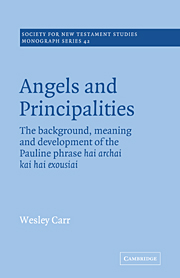 Angels and Principalities
Angels and Principalities A major difficulty in the study of the language of the powers in the NT is that there is no immediately obvious source from which it derives or background into which it fits. Evidence that is adduced in various lexicons and word studies is often taken from the second century A.D. or later.
Moulton and Milligan (The Vocabulary of the Greek Testament (London, 1929)) offer no examples of ἀρχή, ἃρχων, ἀξουσιαι or δύναμις prior to the second century A.D. in any other meaning than the recognised classical uses, among which a supernatural sense, when the words are used absolutely, is not found. There is a similar lack of evidence in the LXX, where the words all occur, but not necessarily in an explicitly angelic sense. One exception may be noted: in Dan. 10 there are references to οιἄρχοντες, ‘the princes of the nations’, and in 7: 27 the ἀρχαι are mentioned. But immediately to relate the two words here, as does Delling, does not take account of the different provenance of these two sections of the book. In the absence of further evidence it is doubtful whether such an association may validly be made, as will be demonstrated, ἃρχοντες also appear in Ecclus. 10: 14 and elsewhere in that book. Again, however, there is no obvious reason why in any passage they should necessarily be interpreted in an angelological sense.
To save this book to your Kindle, first ensure [email protected] is added to your Approved Personal Document E-mail List under your Personal Document Settings on the Manage Your Content and Devices page of your Amazon account. Then enter the ‘name’ part of your Kindle email address below. Find out more about saving to your Kindle.
Note you can select to save to either the @free.kindle.com or @kindle.com variations. ‘@free.kindle.com’ emails are free but can only be saved to your device when it is connected to wi-fi. ‘@kindle.com’ emails can be delivered even when you are not connected to wi-fi, but note that service fees apply.
Find out more about the Kindle Personal Document Service.
To save content items to your account, please confirm that you agree to abide by our usage policies. If this is the first time you use this feature, you will be asked to authorise Cambridge Core to connect with your account. Find out more about saving content to Dropbox.
To save content items to your account, please confirm that you agree to abide by our usage policies. If this is the first time you use this feature, you will be asked to authorise Cambridge Core to connect with your account. Find out more about saving content to Google Drive.